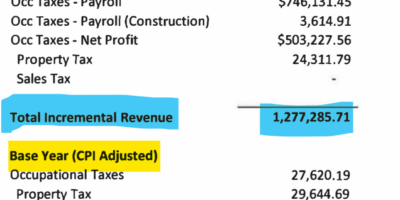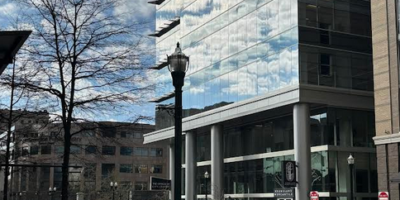The educational-municipal complex
By Danny Mayer
Editor’s Note: This should be the first in a three-part look at Town/Gown economic relationships
“[H]ow people react when something is publicly staring them in the face is one thing. How they react in the much more common situation where the gloom of obscurity hides the unpleasant facts is another.”
Lexington Herald Leader, “Cut-and-paste lessons,” March 15, 2011
Angelou Economics is one of a relatively new breed of business, urban economic development consultants, that has arisen over the past 20 years. Mostly, such groups adhere to a set of assumptions most popularly espoused by the academic Richard Florida. Florida’s general thesis holds that creativity drives growth. Because of this, Florida concludes, city survival depends upon attracting the somewhat limited global class of creative people who make cities grow—real selective consumers who, alas, apparently circulate the world looking diligently for cool places in which to live and/or visit.
Unfortunately, the creative class is not well defined. Doctors and engineers are always creative class. Always. Academics are normally creative, though Florida’s hazy on the creative distinctions between the adjunct teacher living below the poverty line, the graduate TA also teaching below the poverty line and the tenured literature professor doing research from some remote location.
On campus janitorial staff, while geographically close to creativity, are not creative class. Neither are waiters, unless they have a college degree in the fine arts or humanities, or are in fine dining. Artists are desirable, but the scale is hazy. It’s not clear whether, say, working 30 hours at McDonald’s and sketching things at home on spare computer paper a couple days a week constitutes being an artist in the economically uplifting sense of the word that Florida intends. Techies, you probably already know, are fucking off the charts creative.
As cities have become enamored with Florida’s theories on capturing this brand of peeps, urban economic development consultants have sprouted up in a number of guises. Their main mission: develop successful strategies for attracting and retaining the mythic “creative class.” Smaller homegrown varieties of this business include Eric Patrick Marr’s Lexonomics and Sylvia Lovely’s New Cities Institute; larger names include recently certified “Innovation Coach” Peter Kageyama of Creative Cities Productions, who visited Lexington last year.
Angelou Economics, the Austin, Texas firm paid $150, 000 by the city and city business leaders to produce an economic development study of Lexington, was by most accounts well-respected in the consultancy field, claiming over fifteen years experience. Angelou’s niche is economic development via technology, a supreme creative class endeavor. The company claims to make “communities more competitive” by creating “economic development strategies for communities that want to expand their high-tech base, through the recruitment of businesses and the creation of new companies.”
In March, ProgressLex contributor Ben Self reported that Angelou’s final draft of its Lexington study, which was to be submitted a week later to Commerce Lexington and Mayor Jim Gray, was a half ass job. Much of the report was simply cut and pasted from a variety of other studies Angelou had done for other cities. “Some are so horrible,” Self observed, that the company had “forgot to delete the spaces before the text when they replaced the previous city’s name with “Bluegrass region” for our report.”
Self and the rest of ProgressLex notified public officials (Jim Gray), mobilized the public into action, and even provided a forum for Angelou to respond—all in all an exemplary and inspiring model of committed citizen journalism. Ultimately, Angelou agreed with Self’s initial demand to return the city’s $75,000 investment. The company also agreed to significantly revise the document before turning in a final draft. The demands were met, no doubt, in part because of the pressure Mayor Gray applied to Angelou, and in part because of the pressure the likes of ProgressLex, Barefoot and Progressive, Lexington Herald Leader, Business Lexington and other media outlets kept upon the consultancy group and the mayor to do what was right. It was a wonderful thing to experience and participate in.
Cementing progressive narratives
Tracking the response to the Angelou report as things have unfolded over the past month has been quite interesting.
Angelou is, at best, a progressive cautionary tale, and at worse, a pretty damning indictment of many assumptions progressives hold dear here in Lexington. Angelou came well-recommended, with creative hub Austin, Texas, hometown bonafides to prove it. It claimed expert knowledge in high tech industry recruitment, a subject that creative class journalist proponents like Tom Eblen regularly pleaded with city leaders to develop. ProgressLex, where Self published his findings on Angelou’s draft report, has an explicit mission to promote progressive ideals, most of which overlap with creative class ideology.
In addition to the press, city leaders have enthusiastically supported many of the vague creative class initiatives eventually put forth by Angelou. A year earlier in April, Lexington became “Tech-stington” for the city’s officially declared technology month. That same month, Lexington hosted the Creative Cities Summit, complete with feature speaker Richard Florida and main under-card performer Peter Kageyama. The message coming from Creative Cities was pretty clear: keep the bluegrass beautiful, develop downtown and give it the amenities to attract good people. Support bourbon, horses, UK and artists, fuck the Webbs, and find you a billionaire to invest in your city’s underclass. Technologically speaking, I recall several participants describe the stage’s tech-on-steroids feel as overwhelming and fascist.
ProgressLex promoted the hell out of Creative Cities, as did the Herald Leader, led by Tom Eblen, and Business Lexington. It was twittered to death, and blogged, too. I’m pretty sure Lee Todd was there. So was Newberry, much of the city council, etc. You get the point.
And if you don’t, it’s this: in the context of a concerted cry by city leaders for the city to gosh-darn it finally get a good downtown so “we” don’t lose out to “them,” Angelou coming in the cross-hairs of city leaders was like dropping a Hustler or Playgirl in the lap of a thirteen year-old boy. It didn’t take much, I’m sure, for the city to spew forth a $75,000 payload. Frankly, I expected more.
While this may explain why the progressive blogosphere came down so hard on Angelou (Oedipal trauma), it also explains how progressive leaders and followers subsequently critiqued Angelou’s report. Most public responses critiqued the content while they embraced the message. In other words, right message, but wrong, poor or unethical implementation or packaging. As I heard a democratic operative describe an unsuccesful Republican bill, “It did not convey the appearance of…”
In what is widely regarded as the best analysis of the Angelou report, blogger Rob Morris wrote: “The recommendations that Angelou makes aren’t bad. They recommend creating a better support network for entrepreneurs. They recommend setting up a minority business accelerator. They recommend setting up a comprehensive marketing plan for Lexington to help recruit new businesses. The trouble with Angelou’s report..is that ‘Lexington’ is missing. Much of what makes Lexington special and unique – our history, our geography, and our culture – is largely absent from the Angelou strategy.”
Within the framework he sets up—content but not message—Rob’s analysis is spot on. The Angelou plan imagines a dream Lexington that has little relation to the city most of us inhabit. Blatant plagiarism, even in defense of OK recommendations, plays to progressives about as well as their dopplegangers, the Tea Party, take to Jesus-bashing. We Lexington yuppies don’t like to be reminded that despite pretensions we are in fact small-town rubes in some greater global con game.
Yet when it came to the report’s message, all folks–most of whom self-identify as progressive–seem to agree with Rob that the Angelou content was generally fine: boiler-plate regurgitations, sure, but nonetheless creative ideas about technology clusters and capitalizing upon local assets. No mention by Tom Eblen, in his “this is our consultancy CenterPointe moment,” that his articles have been juicing the city market for creative consultancy work, from his Creative Cities reporting on through to his Pittsburgh dispatches and WEG brand-identity coverage. Or that before Angelou submitted the plagiarized draft, it used ProgressLex as a vehicle to promote it’s claims for community engagement.
No media outlet covering the saga has yet to look into how Angelou got hired, which offer insights into whether any city assumptions created the conditions for the Angelou hoax. Nobody’s asked whether a consultant “specializing in the site selection needs of the technology industry and the communities seeking to recruit them” is good economic policy. I’ve seen no media or council work comparing, say, the city’s investment and outcomes in Creative Cities to its similar investment in Angelou—both, after all, do grow from the same philosophical and practical mulch, and both were funded in part by city money.
Florida does Lex again: the return of the Angelou hoax
Here’s why this is important. In the absence of that discussion about message—whether the city needs to invest in an economic strategy concerned with positioning itself as a net attractor of techno-creatives and their needed communities—Angelou went ahead and did what companies of that sort do best. It re-wrote its work, changed allegiances from Commerce Lexington to Jim Gray, and stayed on message while changing its content.
The more specific revised report has made a unique turn. The business featured most in the new Angelou report is the University of Kentucky, technically not a business at all. Angelou’s revised “Top 12 priorities,” on page 9 the report’s first offering of specific courses of action, makes specific recommendations for extending city relationships with UK—the first and fourth priorities listed. (The minority business accelerator fell from its featured position in the draft to point eight.)
Strategy 1.1 in the revised report reads, “Build upon the success of UK’s Von Allmen Center for Entrepreneurship to become a nationally recognized hub of entrepreneurship training.” Strategy 2.1 reads, “Brand UK’s Coldstream campus to specific research and development activities occurring at the campus. ”
Curiously, the revised report’s interest in UK seems to deeply mirror the interests of its new overlord. By coincidence, Jim Gray has also recently taken up the town/gown relationship with UK in a number of places, mostly with the public or tacit support of his progressive followers. Downtown, Gray has called for a thorough study of the Rupp Arena area. On the pretext of doing what it takes to sustain a growing downtown renaissance, Gray has set clear terms for the study: either renovate for an arts/entertainment district or rebuild the entire arena. Doing nothing, it seems, is not an option.
In the suburbs, Gray’s work selling UK’s (underperforming) Coldstream Research Center as “leverage” for city-wide economic development closely mirrors the content-friendly revised Angelou document. This synergy between mayor and Angelou has been fortuitous, as in the most recent special session of Kentucky Congress, Democratic senator Damon Thayer passed a bill—one of only two passed in the session—that created a special exception for university research parks and military bases to be considered for TIF funds. The bill was explicitly written for Coldstream, which means even more city and university money should soon pour into the Legacy Trail area along Newtown Pike.
What do these new connections between the city and university mean for us? Is the inevitable message conveyed in creative class manifestos, a pop-social theory emanating from academia that’s been taken up here in Lexington by two abashedly pro-business leaders, one that is truly in the collective good?
In its editorial coverage of the failed first draft, the Lexington Herald Leader mocked Angelou for repeating common sense ideas already widely noted by locally produced city planning documents. By way of example, the Leader looked to the Angelou draft and wrote, “”Then there’s this: ‘Fully leverage regional higher education institutions.’ Is there any economic development scenario in which we wouldn’t want to leverage our higher education institutions?”
One might describe the Leader‘s statement as the ideological endpoint of the Educational-Municipal complex (or hoax): a progressively imagined, academically endorsed, media supported, and publicly funded leveraging of higher ed for city-wide economic development. Angelou’s report just seems to put everything together in a real fine print: more Coldstream, more downtown Rupp-ish area development, more use of UK’s Von Allmen Center for Entrepreneurship. Same message, more specific content.
Despite its laudable critique over the funding of the UK Wildcat Coal Lodge, the Leader can’t even imagine an economic development scenario where leveraging educational assets would not be desired. The result of this lack of imagination? By default, all the town/gown projects imagined by Angelou and (supported thus far by Gray) are presumed, by default, to be worthy uses of public city funds. In other words, they exist outside the bounds of civic conversation and debate.
The revised report seems to enable a whole lot of people to do a whole lot of things–UK, its basketball donors, the city, private developers, etc. In the case of Angelou Economics, we should ask, whose hoax is whose? Me….I’ve got my suspicions that it aint just Angelou playing us.
To be continued.




Rose Chisholm
An eye-opening article.
I’ve been coming to the Lexington-Lawrenceburg area annually for over 30 years to visit my husband’s family. Last year, we moved back. We’ll be moving soon into lexington.
There is a cautionery tale in your descriptions of creative+technology types as saviors. Yeah, saviors of what? ! I was born in Seattle in 1957 and lived in the area until 2013. Having seen the enormous change in personality and reputation of that region, I have no desire to move back. While I hope Lexington will economically move ahead and perhaps become ‘more’ via technology influences and the wonderful education institutions, I hope endeavors to ‘enrich’ the region will not end up creating a new aristocracy you described so well.
Interestingly, I am pursuing a new career that you seem to view negatively (urban development consultants), although my focus is on Infrastructure Planning & Management. I am a graduate student with the University of Washington (online) utilizing the many Kentucky initiatives as case-studies within my courses.
I look forward to learning more from you.